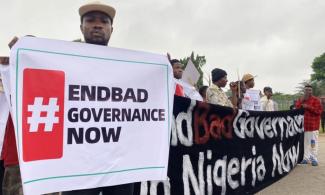Africa’s Youth Protests: Battling Misinformation in the Fight for Change

BY: Mustapha Lawal
In the past year, the African continent has witnessed a surge in protests, with young people leading the charge against economic hardship, political repression, and social injustices. From Kenya’s anti-tax demonstrations to Nigeria’s outcry over economic policies, the streets have become arenas of resistance.
This growing wave of activism signals a continent-wide demand for fundamental reforms. However, alongside this surge in civic engagement, a dangerous parallel trend has emerged—one that threatens the very foundation of informed activism: misinformation and disinformation.
For every legitimate protest, there is an equal, if not greater, effort to distort the facts. Governments, political actors, and even opportunistic online influencers exploit digital spaces to manipulate narratives, delegitimize protests, and spread fear. In Kenya, false claims about “foreign-funded” protest movements aimed to discredit legitimate grievances. In Nigeria, manipulated videos circulated during the #EndBadGovernance protests to frame activists as violent agitators. These tactics are not new, but their sophistication is growing, making it harder for citizens to separate fact from fiction.
If 2024 was a year of rising dissent across Africa, 2025 is already shaping up to be a year of sustained confrontation between governments and their people. From Kenya to Nigeria, Senegal to South Africa, a wave of discontent has continued to surge, fueled by economic hardship, political disillusionment, and the increasing role of misinformation in shaping narratives. Across the continent, young people—often underestimated by ruling elites—are leading the charge, demanding accountability in governance, fairer economic policies, and an end to oppressive laws.
In Kenya, where mass demonstrations against tax hikes first erupted in 2024, the government’s attempt to control digital spaces has deepened mistrust. President William Ruto’s administration has been accused of using misinformation to propagate his administration efforts. Through a well-coordinated digital communication machine, Kenyan government ministries and departments have almost managed to shape a parallel narrative, downplaying economic hardships facing millions, discrediting critics, including independent media, and managing public perception carefully. A Nation.Africa report, tracking a series of attacks on individuals and companies, found that the majority of related posts originated from the same users.
The government uses X and TikTok to shape public opinions, hiring social media influencers to push exaggerated achievements, selective data, and, in some instances, outright falsehoods to attack critics. Familiar social media accounts and suspiciously new ones have created a network of ‘digital mercenaries,’ labelling themselves as communication strategists and digital advertisers. When called upon, they push and amplify the messages of the highest bidder, often the Kenyan government.
“It’s a well-oiled narrative control system where State House, government ministries, and even members of parliament hire people believed to have sway on social media to push misleading content,” said Allan Magaki, a social media researcher in Nairobi.
“As part of its strategy, the government is enlisting influencers to promote projects like the controversial housing levy and highlighting completed house units,” said Prof. Fred Ogolla, an economist in Nairobi. “ You don’t need bloggers to tell Kenyans that houses have been built, they need to see the houses built.”
Yet, young Kenyans, leveraging social media and digital activism, have continued to push back, exposing economic mismanagement and government excesses. The battle over information—who controls the narrative and how it is disseminated—has become just as critical as the protests on the streets.
Similarly, in Nigeria, the youth-led #EndBadGovernance protests evolved beyond a singular movement into a broader resistance against rising living costs, police brutality, and government opacity. Despite repeated assurances from the Tinubu administration, many Nigerians remain unconvinced that leadership is prioritising their needs. In response, authorities have not only resorted to heavy-handed crackdowns but have also engaged in counter-messaging, labeling protesters as agents of opposition parties or foreign interests. This tactic, which was also deployed in Kenya, aims to delegitimize grassroots activism by planting doubt in the minds of the public.
In Senegal, protests over election delays and constitutional amendments turned violent, with security forces clashing with demonstrators. The political maneuvering of President Macky Sall’s government drawn sharp criticism, with young activists refusing to accept drew legal processes about attempt to extend political rule beyond agreed terms. Unlike previous years, where public frustration often simmered under the surface, 2025 has seen a rapid escalation in demands for institutional change.
A recurring theme across these protests is the role of misinformation. Governments are deploying sophisticated digital strategies to counter dissent, including using AI-generated content, deepfake videos, and mass social media campaigns to delegitimize movements. In Kenya, for instance, state-aligned influencers have been accused of pushing misleading narratives about their projects. Nigeria’s digital space has similarly been flooded with conflicting reports about the legitimacy of anti-government movements, creating an environment where truth itself becomes contested.
As 2025 unfolds, the question remains: Will African governments respond with genuine reforms, or will they double down on repression and digital misinformation? If the latter, history suggests that no amount of internet blackouts, propaganda, or intimidation will suppress the collective will of an informed and determined people.
Fact-checking has never been more critical in Africa’s fight for accountability. The ability to verify claims, expose state propaganda, and ensure that activism is rooted in truth is an essential tool for change. A misinformed protest is as dangerous as an uninformed electorate—it plays directly into the hands of those who seek to maintain the status quo.
If Africa’s youth-led protest movements are to achieve lasting impact, they must not only challenge power but also safeguard truth. In a digital age where information is weaponized, ensuring that movements remain fact-driven will determine whether this new era of resistance translates into real, lasting change.




